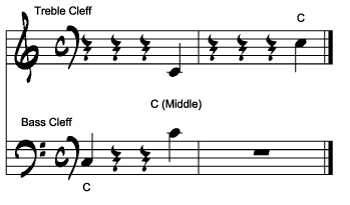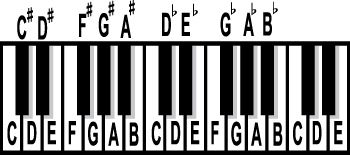Difference between revisions of "Translations:AY Honors/Music/Answer Key/19/en"
m (FuzzyBot moved page Translations:AY Honors/Music (General Conference)/Answer Key/19/en to Translations:AY Honors/Music/Answer Key/19/en without leaving a redirect: Part of translatable page "AY Honors/Music (General Conference)/Answer Key") |
(Importing a new version from external source) |
||
| Line 1: | Line 1: | ||
</noinclude> | </noinclude> | ||
<!-- 2. Write a scale in both treble and bass clef. --> | <!-- 2. Write a scale in both treble and bass clef. --> | ||
| − | {{: | + | {{:AY Honors/Music/Clefs}} |
<noinclude> | <noinclude> | ||
Latest revision as of 20:07, 8 September 2021
In order to write a scale on your own, you are going to need to study and understand a few musical terms. The following sections will help you better understand the musical theory that makes up a scale.
Clefs
The word clef is used to describe the symbol at the beginning of the set of five lines on which notes are printed. This symbol tells the player what the notes are going to be within the five lines. In piano music both Treble and Bass clefs are used. Usually, the pianists left hand plays the lower notes in the bass clef with his left hand, and the upper notes in the treble clef with his right hand.
This illustration shows a note called middle C. The note drawn in the bass clef is exactly the same note as the one drawn in the treble clef.
The set of five lines on which the notes are drawn is called a staff.
Note Names
The notes on the treble clef have different names for the notes within the lines or on the lines of the staff than the note in the bass clef. These diagrams show the names of the notes in between and on the staff lines for both treble and bass clef.
Notes names can be seen on a piano keyboard as well. The notes played with the black keys on a piano keyboard are named with the note letter plus a symbol to indicate if the note is above or below the note named by a semitone. The ![]() symbol means the note is a semitone above the note name and is called sharp. The
symbol means the note is a semitone above the note name and is called sharp. The ![]() symbol means the note is a semitone lower and is called a flat.
symbol means the note is a semitone lower and is called a flat.
Notice how the black keys can each be named with two names. This is called enharmonic spelling.
Sharps and Flats
Sharps and flats are notated (drawn on the staff) by placing the sharp or flat symbol in front of the note on the staff. This example shows the notes D, E, F![]() , and G.
, and G.
Scale Root
The note that the scale starts on is called the root note. Below you can see that the first note for the C Major Scale is the note named "C"
Scale Degrees
The word degree in music simply means a number that has been assigned to each note within a scale. In the C major scale below you can see that the scale degree of E is 3, F is 4, and so on.
The scale degree number 1 will not always be assigned to the note "C". It is assigned to the starting note of the scale or key of the piece is composed in. For example, a song in the key of "G" would have the scale degree 1 assigned to the note "G".
Based on what you now know about scale degrees, note names, clefs, and using the whole tone / semitone patterns shown above, you should now have enough information to write a scale in both treble and bass cleff.






